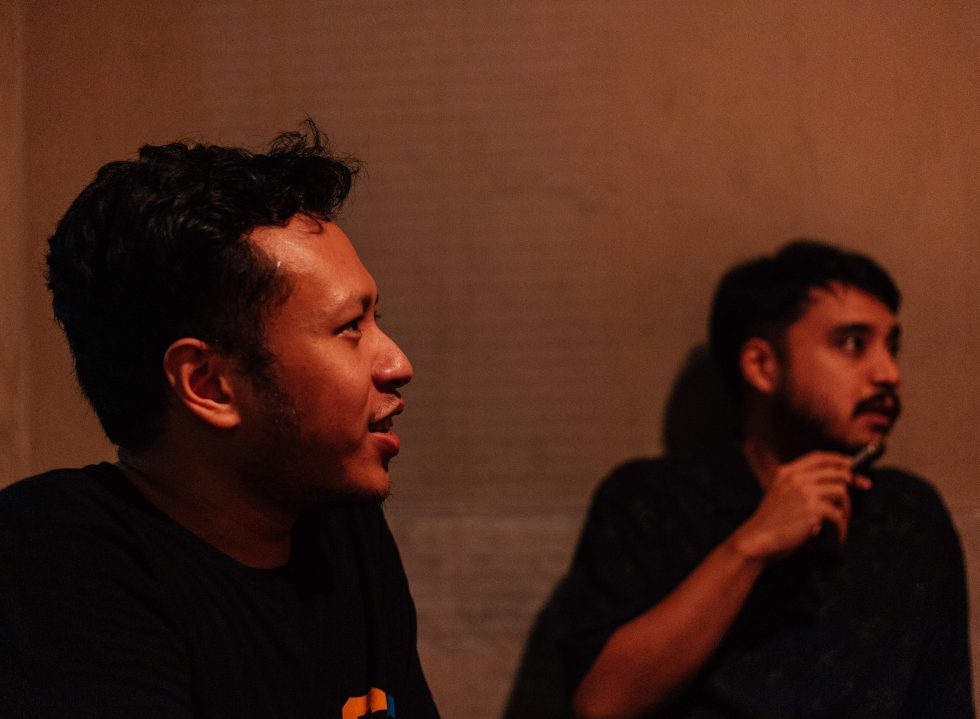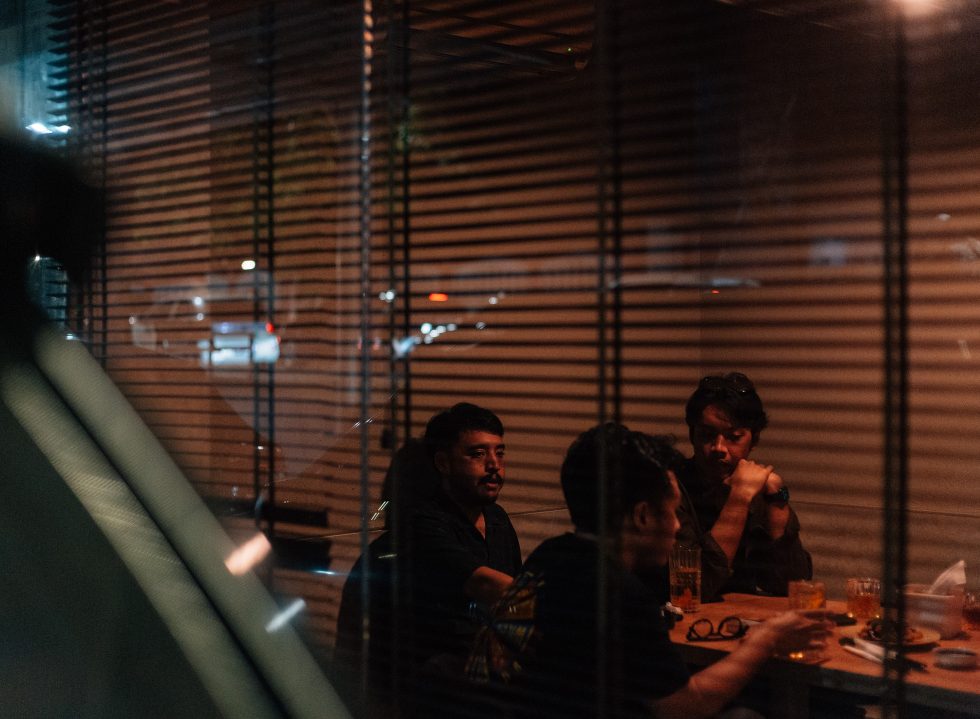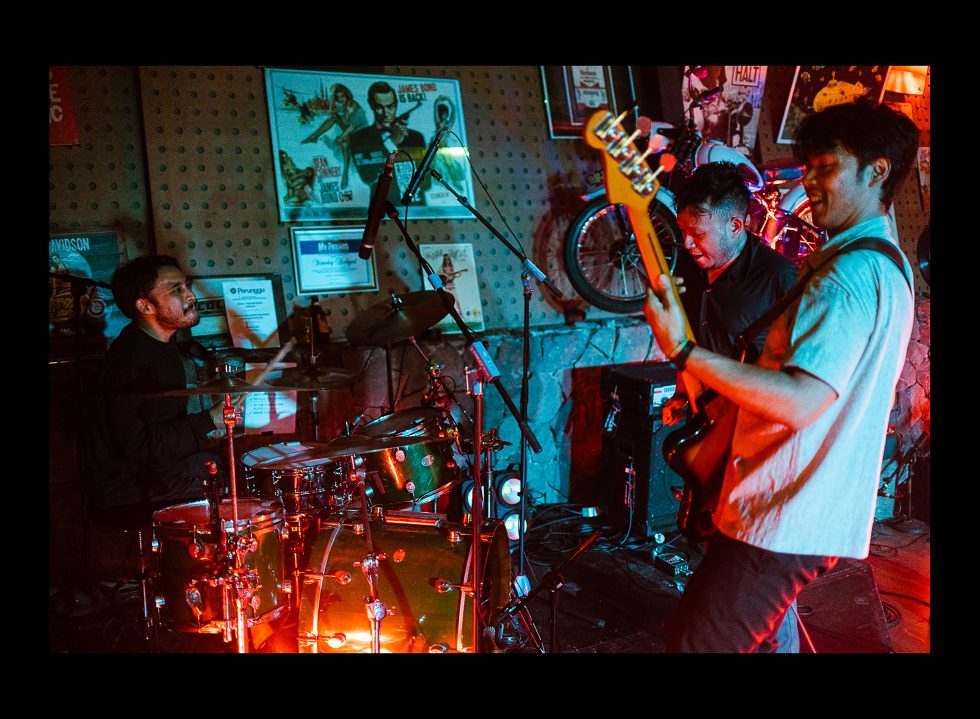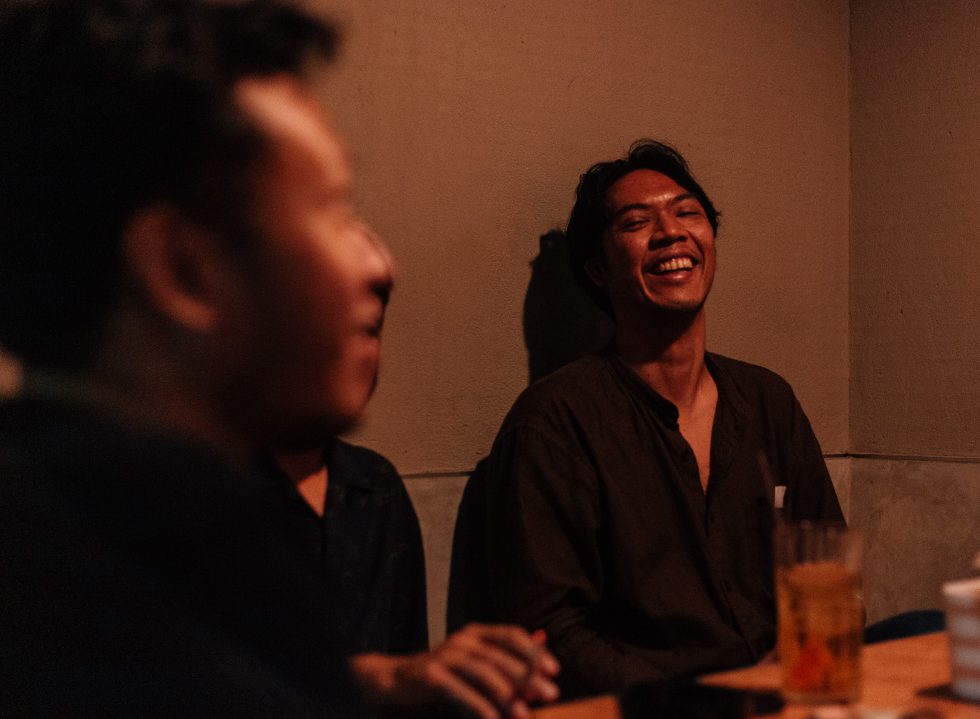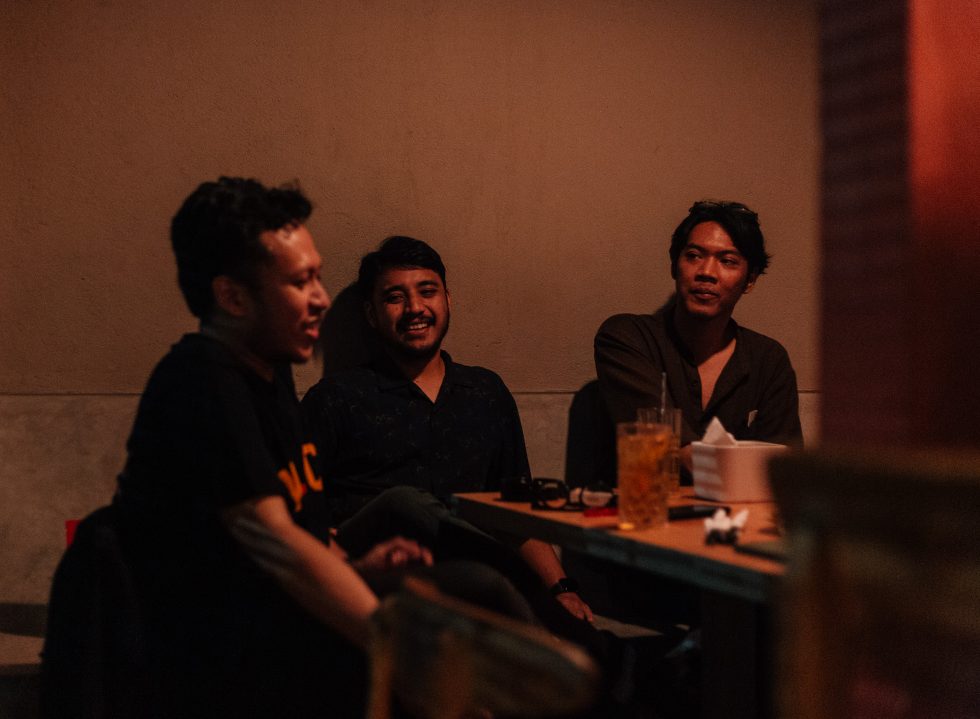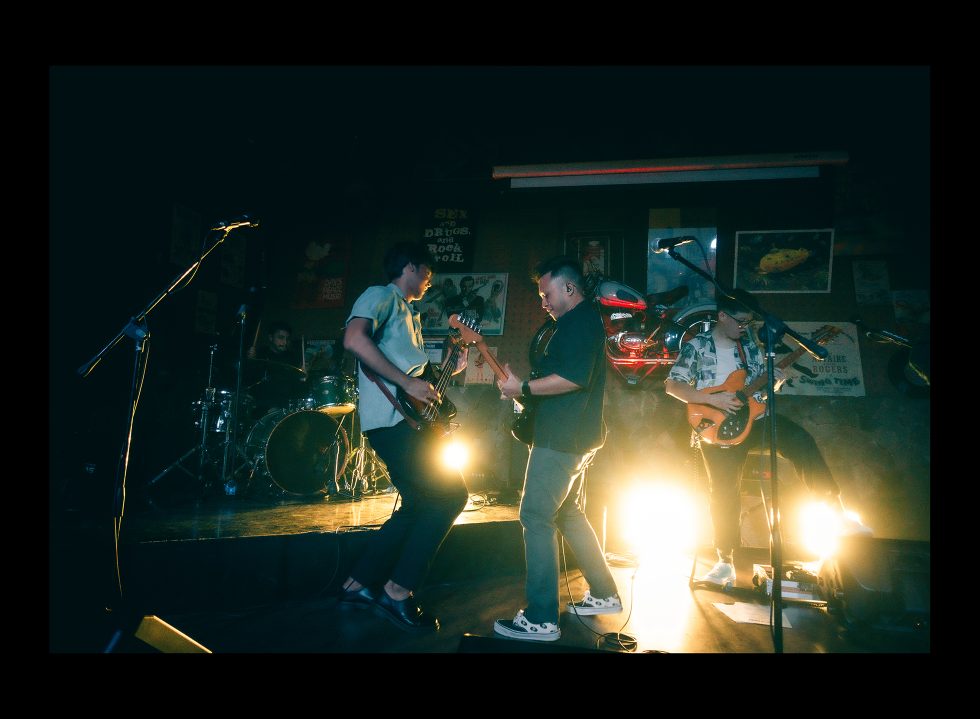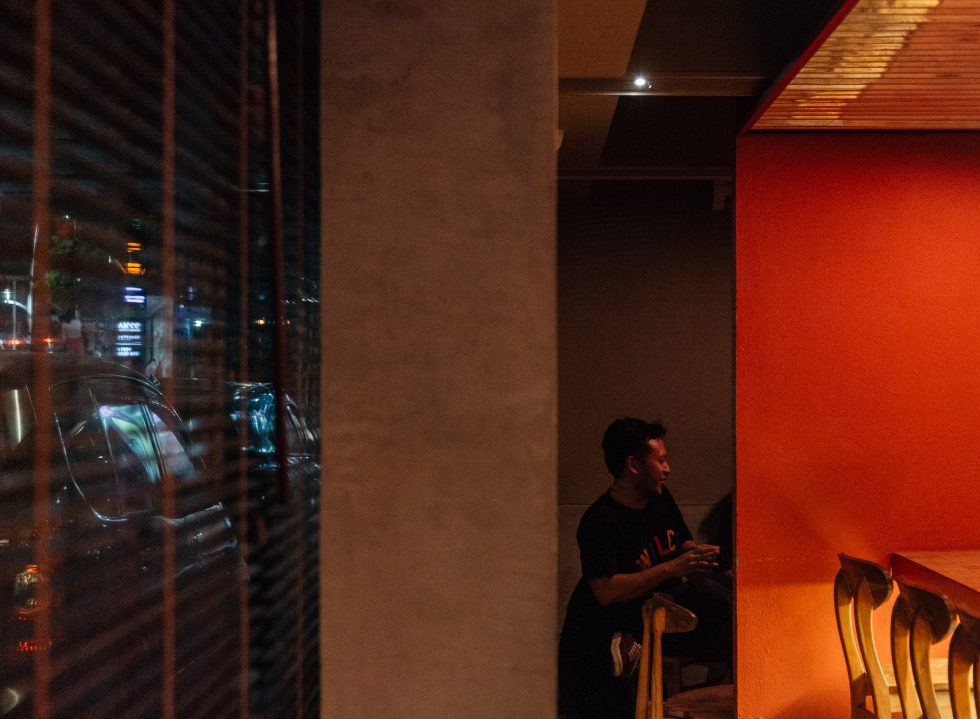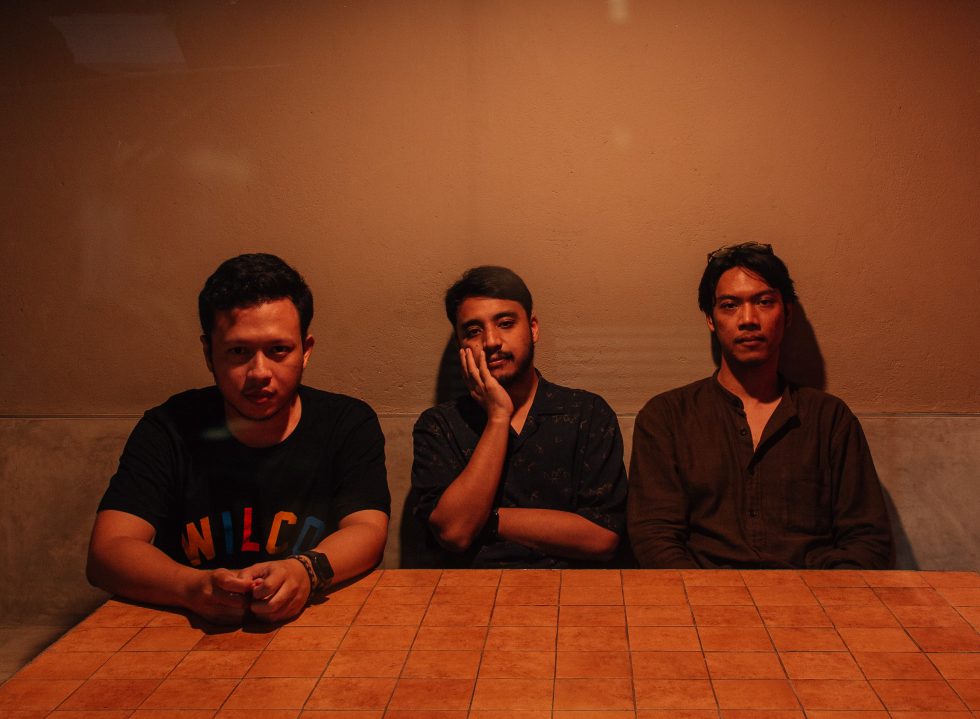When the three members of Perunggu, Adam Adenan (vocal and bass), Ildo Hasman (vocal and drums) and Maul Ibrahim (vocal and guitar), met for the first time in the studio just a few months short of the pandemic, it felt like just the right time. Shedding the mentality of their youth, the trio found commonality in wanting to make music that candidly captures this slice of time in their lives.
Perunggu isn’t fixed on fitting into people’s worlds, but rather through their music, gives glimpses to theirs. Swinging between the disarmingly vulnerable ’33x’ to the frenzied beats of ‘Tarung Bebas’, their debut album, ‘Memorandum’, is a mirror to their personal yet equally relatable navigations of love, family and the self.
Lounged into a corner at OOMA in A3000 compound, where the band often frequents and recently held an album release party, they share their thoughts on their younger selves and putting their ego aside, the pleasures of creating music for yourself, and how they don’t feel bound to a song’s meaning or their pop-rock genre.
To start, what was it like to continue creating during the pandemic?
Ildo Hasman (IH): At that time, Adam had just returned from his post-graduate studies in the UK, but we were all home-bound so we couldn’t meet up for practice. Somehow, with all the time spent at home, Maul got productive and kept sending us new songs, about 18 in total.
Maul Ibrahim (MI): I was at home a lot so I had a lot of free time to make music. There wasn’t any pressure to make an album at the time, but we instinctively started filtering out the songs and ended up with 11. We would meet up at my house-turned-studio after work and start practising there. It was a very casual start, we just wanted to play and jam around. That’s it.
A lot of the songs in ‘Memorandum’ touch on relatable themes of work, family and love. What was it that you guys hoped to express through the album?
MI: Memorandum means memo or notes, and we wanted our album to feel reflective of the phase of life we’re in. It was about sharing what we know, what we’re currently experiencing and how we’re responding to that. It’s not wrong to say that Memorandum was 30 years in the making, in a way the lyrics and our music style is developed out of our past experiences pieced together. I would say it’s simple, but not shallow. It’s very personal to us and thankfully people can relate to it too.
IH: Music-wise, it kind of jumps from one thing to the next. I think we got to explore a lot of different styles and each song represents an emotion. The arrangements were intended to represent that. But I think the red thread is the point of view and perspective that the three of us, as well as many others of our age, also share.
Adam Adenan (AA): It feels honest because we weren’t trying to do something we know we couldn’t do. We approached it with an awareness of what our strengths are and we wanted to play on that. It’s a collation of us and our past, all the music we used to play and listen to.
And each of you was previously in bands of your own, how did that affect the creative process of the album?
IH: I think having our own musical backgrounds and experiences really helped the process. When we started again, we were all excited about it and wanted to create something together. We also share the same musical taste so that made it all the easier. I think if we had released this in our 20s, the sound would’ve come out so differently. We would have wanted to show off, as we were still heavily listening to the likes of The Mars Volta.
MI: Yeah, or Animal Collective. The songs we’d have came up with would’ve been crazy! Now that we’re all in a similar stage of life, I see how maturity plays a big part in it too. When we were younger, our ego was bigger and being in a band was considered ‘cool’. Whereas now, this is what we genuinely enjoy regardless of what people say. In a way, I wanted to somehow redefine the term ‘cool’ — the word should mean having the courage to be yourself and do what you enjoy, in a very unpretentious way.
It’s interesting that you guys touched on age, ego and maturity. How do you think this has played a part in redefining your understanding of success in music?
MI: For me, it’s simple. A song that I can proudly sing to in the shower, that’s how I would measure it now (laughs).
IH: Me too! When it’s a song I want to listen to on repeat, that’s enough for me. Plus, if it’s a song my kids can enjoy and sing along to.
AA: Recently, I met up with a friend and he brought his kid with him and he introduced me as ‘the uncle from the music video’. The same goes for me; it’s when I get to make music I don’t get bored listening to. If you’re in the car with me, most likely Memorandum will be playing in the background, I’m pretty sure my girlfriend is bored of it by now (laughs).
As an after-work band, how do you guys juggle your music with full-time jobs and your personal life and families?
IH: I don’t think we’d have been able to do it in our 20s. We didn’t have the financial freedom then to do this seriously (laughs). It feels much more manageable and realistic now, the momentum feels right to take time for ourselves and, in a sense, be a little selfish and do what we enjoy.
MI: I think back then, it would’ve been more difficult to balance work demands and create music that we would be proud of. Another big difference is how our families and partners weren’t as supportive before, some even requesting us to stop. But now, they would be the ones asking ‘when are you going to perform or practice next?’ There’s an ease about it now.
Going on from that, how has the response been from your families and friends?
IH: I don’t intentionally try to share my music with my family, especially my parents. But with Memorandum, their response has been surprisingly positive!
AA: It’s the same for me. Although my parents have always been supportive, in the past I don’t think they were able to connect to the music I was doing, I was doing a lot of post-rock and metal at the time. I feel like it’s easier for them to understand now, there are times when I’m in my room at home and I can hear them listening to our songs out in the living room. That was a little weird but new for me. (laughs)
MI: For me, the response was quite extreme. Before, my mother would cry because I wouldn’t stop playing music, but now she would cry listening to the song. There is one song that is very personal to our family and she called me right after listening to the song, and we cried together. That’s a new and humbling experience for me. On the whole, I would say it’s been quite warming to see how many people have responded, and we’ve gotten a lot of positive feedback.
With all the songs being so personal, is it hard to have a favourite?
IH: I have different favourites to listen to and to play on stage. ‘33x’ is a steady go-to, but maybe for live performance, I’d go with ‘Prematur’, which hara featured in.
AA: The lyrics to ‘33x’ made me cry. It touches on this state of searching at the age of 29, and I listened to it on my birthday just as I was turning 30 (laughs). But my favourite would have to be ‘Kalibata, 2012’. I enjoy songs that I can connect to emotionally, and from the lyrics to composition, listening to ‘Kalibata’ feels like watching a movie; the song flows through a scene-by-scene narrative and an end.
MI: My personal favourite is still ‘33x’. It still surprised me that I wrote the lyrics, and people’s responses have been so moving. But recently, I connect a lot to ‘Pram’ or ‘Pastikan Riuh Akhiri Malammu’, especially after the release of the music video. As a lyricist, there’s always an initial fear I have when my song is being translated into a music video, that it would alter the original story I had in my head. Especially because we try not to involve ourselves in the visual process. When working with the directors, we want them to be free to interpret the song themselves. But in the end, the video was able to enhance the emotions and in a way complete the song experience, reaching more people in the process.
From a personal song that I originally wrote for my kid Pram, people were able to draw from that and connect with their own experiences. That’s special to me. But if we’re talking of a live performance, it’s ‘Canggih’. There’s just a certain buzz of energy whenever we play that song.
And would you say song-writing comes naturally to you?
MI: Yeah, I think so. Sometimes people ask me, why are the lyrics in Indonesian? But for me, it all boils down to writing in a way that is honest and reflective of where I am at the moment. It just feels like the most natural way for me to express what’s on my mind. We allow our songs to be as ‘naked’ as possible. It’s interesting how words we use daily can be strung together to tell a story.
Going back to ownership, how do you ‘let go’ when it comes to trusting others to interpret and visually narrate the songs?
MI: For us, it goes back to our capabilities and knowing what we’re able to do. It’s as simple as that. We mutually agreed that we didn’t want to limit people’s interpretation of the songs, t’s a shame if the meaning is too dictated, it feels too restrictive.
But Adam, you directed the music video for Biang Lara. What was the experience like?
AA: The video itself is just an echo of the lyrics. The title for Biang Lara was inspired by a ferris wheel ride from Dufan, Biang Lala. The song kind of speaks on just enjoying the ride and life as it is, with all the ups and downs. I tried to reflect that through snapshots of our daily lives; waking up, exercising, having coffee, working, and playing music. There’s quite a lot of hidden messages in the video, in a way it kind of portrayed the same spirit that Perunggu was built on.
Lastly, although some people would refer to you guys as a pop-rock band, would you agree that your songs are quite versatile in the genre? How would you guys categorize yourselves?
AA: I think each of us draws from different musical influences and that kind of just poured itself into Perunggu. It’s a little bit of everything.
IH: I don’t think we would box ourselves as a pop-rock band. But, I think recently our listener’s demographic slowly shifted to a younger crowd. It seems like people who don’t listen to rock can also connect to our songs, we’re not closing ourselves off to one thing.
MI: Again, it goes back to how we want the album to feel reflective of our stages of life. This is what we enjoy playing and listening to at the moment. Who knows, maybe our next album will be a little bit more obscure or indie? (laughs)
